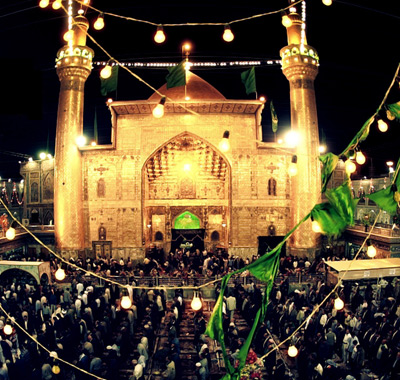
Najaf is considered so sacred because it's the site of the tomb of Ali, the first imam of the Shiites. When Mohammed died in A.D. 632, there was a schism over who should be his successor. A learned council called a Shura selected Abu Bakr, one of the prophet's closest friends and allies. But many of the faithful insisted that Mohammed had wished to pass the mantle to Ali, his cousin, adopted son, and son-in-law. They claimed that the prophet had expressed this desire in a sermon delivered during his last hajj, or holy pilgrimage. Those who revered Ali as Mohammed's rightful heir became known as the Shiat Ali, or "faction of Ali"—the forefathers of today's 150 million Shiites.
Ali eventually did become Islam's fourth caliph. His reign, however, was brief. An extremist sect known as the Kharijites, which advocated death for moderate Muslims, orchestrated Ali's assassination in 661. He was killed in a mosque at Kufa, approximately 6 miles from Najaf.
At that time Najaf was just a minor village. But Muslim tradition held that Abraham who is a venerated figure in all three of the world's major monotheistic faiths once visited the area, and he predicted that it would someday host a shrine of great importance. Abraham also stated that those buried in Najaf would be guaranteed entry to paradise. So Ali had requested that, when he died, he be buried not in his capital of Kufa but rather in neighboring Najaf.
Najaf's founding as a city dates back to 791, when the Abbasid caliph Harun al-Rashid supposedly passed through during a hunt. When the villagers informed him that he'd encountered Ali's resting place, he ordered that a grand mausoleum be built atop the grave. That shrine, the Meshed Ali, soon attracted pilgrims and clerics, and the city became the pre-eminent center of Shiite scholarship.
In addition to Ali's tomb, the city also boasts one of the world's largest cemeteries, the Wadi-us-Salaam ("Valley of Peace"). Several Shiite prophets are buried there, and some believe that Ali himself endorsed the site as part of heaven. Shiites from around the world long to be buried there.
The city's religious importance diminished somewhat during Saddam Hussein's rule, as he brutally persecuted the Shiites; many pilgrims opted instead to visit the Iranian city of Qom. The pilgrimage trade has perked up significantly since Saddam's defeat.
Abraham wasn't Najaf's only famous ancient visitor. According to Muslim lore, one of Noah's sons refused to board the Ark, choosing instead to sit atop a mountain that covered present-day Najaf. But the mountain crumbled, drowning the son, and a river appeared in its place. The river eventually dried up, giving the city its name Najaf means "dry river."
Derived from: Imam Ali Network
